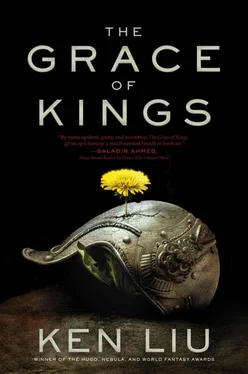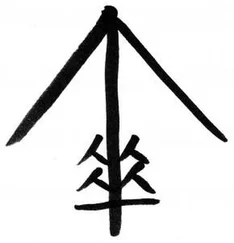“It’s been a long time,” Crupo said, upon seeing his old friend. Tan’s smooth, deep-black face was unlined, and Crupo imagined the life of ease he had led, toasted by kings and dukes, never having to scrabble for a living.
“Too long!” Féüji said, clasping Crupo by the arms. “I had hoped to see you at Master Anji’s funeral, but I understand you were too busy. The master thought of you often during the last years of his life.”
“Did he?” Crupo tried to clasp Féüji’s arms with as much warmth. But he felt awkward, nervous, stiff. After a moment, he stepped back.
They sat down on the soft mats on the floor, a pot of tea between them. Crupo sat at first in the formal position of mipa rari , his back straight and tall and his weight on his knees.
Across the table, Féüji laughed. “Lügo, have you forgotten that we’ve known each other since we were schoolboys? I thought you were here to visit an old friend. Why do you sit as if we’re negotiating a treaty?”
Embarrassed, Crupo shifted into the familiar géüpa to match Féüji, with his bottom on the floor and his legs crossed and folded so that each foot was under the opposite thigh.
“Why do you look so uncomfortable?” Féüji asked. “I think you’re hiding something.”
Crupo started and spilled some tea from his cup.
“I know what it is,” Féüji said. “Old friend, you came to me because you wished to apologize for not being able to dissuade King Réon from his mad vision of conquest.”
Crupo hid his flushed face behind his sleeves as he composed himself.
“And now you’re embarrassed because you think an apology inadequate, when Haan has fallen and I am here, a prisoner awaiting execution. You don’t know what to say.”
Crupo set down his teacup. “You know me better than I know myself,” he muttered. He took out a small, green porcelain bottle hidden deep within his sleeves. “Our friendship is stronger than tea. Let us have something that fits better.” He poured the liquor into the empty cup before Féüji.
“You feel responsible for the thousands slaughtered by Réon in his senseless wars,” Féüji said. “You are kind, Crupo, but do not let your heart be troubled by a burden that isn’t yours. I know that you’ve done your best to try to speak sense to the tyrant. I know you tried to save my life, but Réon won’t allow me to live after having defied him for so long. I thank you, old friend, and I forbid you from feeling any guilt! It is the tyrant Réon who is responsible.”
Crupo nodded, and hot tears flowed down his face. “You’re truly the mirror of my soul.”
“Let us be merry and drink,” Féüji said, and drained the liquor in his cup in one gulp. Crupo drank too.
“Ah, you’ve forgotten to fill your own cup,” Féüji said, laughing. “That’s still tea.”
Crupo said nothing but waited. Soon, Féüji’s expression changed. He held his hands to his stomach and tried to speak, but nothing would come except gasps. He tried to get up but stumbled and fell, and after a while, he stopped writhing on the mat.
Crupo stood up. “I am no longer the second best.”

After all these years, Crupo thought he had finally accomplished his dream. He was peerless, the most powerful man in the land. He finally had the opportunity to show the world that he was, all along, the one who deserved their admiration and praise.
He would be respected .
And yet his work was so unsatisfying, so petty .
“Regent, who should we appoint as commander-in-chief against the rebels?”
The rebels? Those bandits? How can they withstand the might of the Imperial army? A trained monkey leading the army would win. Why are they bothering me with this? It’s a transparent case of petty bureaucrats exaggerating threats to wheedle more money and resources from the throne. I will not be fooled.
He thought about who at the court most annoyed him, who he would rather send far away from Pan, out of sight.
Glancing over at the small shrine to Kiji in the corner, he saw a pile of petitions marked urgent. No matter how hard he worked, there always seemed to be so much more for him to do. He had taken to piling the petitions next to the shrine, idly hoping that showing the god how much he had to deal with might arouse some sense of pity and bring about divine intervention to lessen his load.
All the petitions near the top of the pile were from one man.
Ah, he had it. Surely this was a sign from Lord Kiji himself. Kindo Marana, the Minister of the Treasury, had been hounding Crupo for days about some suggestions for improving the tax system. The sallow, small man was obsessed with trivial matters like taxes and finance; he could not understand the grand visions and the big picture that concerned the regent. Sending the chief tax collector, a bean counter among bean counters, to supervise the army against the bandits seemed deliciously absurd, and he was impressed with his own wit.
“Summon Kindo Marana.”
Maybe I will now finally get some peace to work on my treatise on government. It will be better than anything Tan Féüji ever wrote. Ten, no, twenty times better.
CHAPTER ELEVEN. THE CHATELAIN
PAN: THE ELEVENTH MONTH IN THE THIRD YEAR OF THE REIGN OF RIGHTEOUS FORCE.
A chatelain was just a glorified butler, Goran Pira often thought. There was a time, back in the early days of the old Tiro states, when a chatelain led the defense of a castle and was treated as a member of the nobility. Nowadays, his duties consisted of settling disputes among Mapidéré’s wives, disciplining the servants, balancing the palace budget (though it was a very big budget), and being the emperor’s playmate.
Pira had inherited the position from his father, who had served Emperor Mapidéré’s father, King Dézan. Pira grew up in the old palace, back in the old Xana capital of Kriphi, on Rui, and played with young Prince Réon. The two often got in trouble for trying to peek into the windows of the bedrooms of the younger wives of Réon’s father.
When they were caught, Pira always insisted that he was the instigator, the one who led the prince astray. He was the one who was spanked and whipped.
“That was very brave of you,” Réon said. “You are a true friend.”
“Ré,” he said, grimacing with the pain from the spanking. “I’ll always be your friend. But maybe next time you can be a little bit quieter.”
The friendship survived Réon’s ascension to the Xana throne. It survived the years of conquest and war, when Pira often comforted Réon when he was frustrated with the lack of progress or seethed because of some diplomatic insult. It even survived Réon’s many pompous eccentricities after he conquered the Six States and became Emperor Mapidéré. He might make his ministers and generals tremble with the slightest movement of his pinkie, but away from the audience halls, back in the living quarters of the palace, he was still just Ré, Pira’s childhood friend.
But the friendship could not survive Lady Maing.
Maing was from Amu, the daughter of a duke who refused to surrender to the Xana army. She was taken as a captive back to Pan, where Emperor Mapidéré built his new capital, and made to work as a serving woman in the palace kitchen.
Pira had never paid much attention to the women of the palace. It was a necessary part of surviving the job. A chatelain who could not resist the temptation of his lord’s many beautiful wives and captives did not have a very long career.
Pira was married to a girl from Xana picked for him by his parents. They were polite to each other, but they rarely spent much time together since Pira was almost always by Réon’s side. The woman bore him no children, but Pira did not care. He didn’t think the life of the chatelain was so wonderful that he wanted to pass it on to a son. Long ago, Pira had learned to suppress his urges as a man.
Читать дальше













